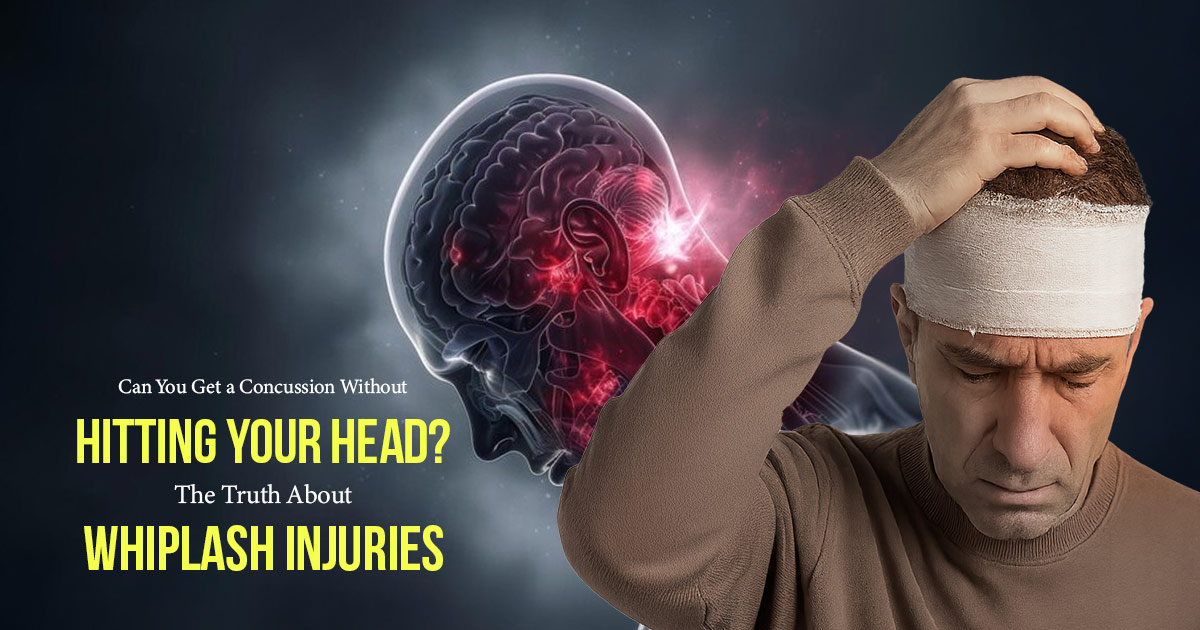Can You Get a Concussion Without Hitting Your Head? The Truth About Whiplash Injuries

When you think of a concussion, you might imagine a football player tackled hard or someone hitting their head during a fall. But what if I told you a concussion could happen without a direct blow? Strangely enough, whiplash, often associated with neck injuries in car accidents, shares a lot in common with concussions, even when there’s no head impact.
A 2019 study sheds light on this connection by examining the strain on the brain during rear-end car crashes and comparing it to the forces seen in sports-related concussions. The findings see that the symptoms of whiplash-like motions and concussions often overlap.
If you’ve ever felt dizzy after a fall or had a headache after a car accident without hitting your head, you might have wondered, “Do you have to hit your head to get a concussion?” The answer is no. And in this blog, we’ll break down how this happens, the symptoms to watch for, and what to do about it.
How Does a Concussion Happen Without a Hit?
Your Brain and Sudden Movements
Here’s the deal. Your brain is like Jell-O floating in fluid inside your skull. That fluid is there to cushion it from normal bumps and shakes. But if something sudden happens, like a sharp stop in a car or falling flat on your back, your brain can slam against the inside of your skull. Boom, concussion.
For example, think about car accidents. Even if your head doesn’t hit the steering wheel or window, the force of your head snapping forward and backward (like in whiplash) can rattle your brain hard enough to cause an injury. This might explain why you’d have a headache after a car accident without hitting your head. Or maybe you took a bad tumble, and now you’re dizzy after the fall but didn’t hit your head. Those forces alone can be enough to get your brain all shaken up.
Everyday Scenarios You’d Never Expect
It’s not just car accidents. Falling, sports, or even awkward movements can do it. Think about this: If you slip on ice and land hard on your tailbone, the force can travel through your body and jostle your brain. Or picture a gymnast who lands poorly after a flip. Even without hitting their head, that sharp movement can lead to a brain injury.
Sometimes, you might notice symptoms and think, “Why do I feel like I have a concussion but didn’t hit my head?” It’s simple! The brain moves, and that’s enough to cause issues.
Spotting Concussion Symptoms
If you’re wondering whether you might have a concussion, here are the key symptoms to look out for:
- Headache – Whether it’s a dull ache or a pounding pressure, headaches are often the first sign.
- Dizziness or balance issues – Feeling unsteady or lightheaded after the accident is another red flag.
- Sensitivity to light and sound – Even the glare of a phone or a TV’s background hum can feel unbearable.
- Brain fog or confusion – Struggling to focus or feeling mentally sluggish is super common.
- Nausea or vomiting – If you feel queasy without any obvious reason, this might be why.
Now, here’s a popular question people ask, “Do your eyes dilate when you have a concussion?” Uneven pupil dilation can happen in severe head injuries, but most typical concussions won’t include that symptom. If one pupil seems larger than the other, though, it’s time to visit a doctor ASAP.
And, yes, it’s possible to have concussion-like symptoms without having an actual concussion. Stress, fatigue, or even minor injuries can mimic these signs, which is why checking with a professional is always a good idea.
Can You Get a Concussion from Falling but Not Hitting Your Head?
Absolutely, yes! Falls where your head doesn’t touch anything can still cause concussions. For instance, landing hard on your butt or back from a few feet high can still transfer force to your brain. This might be why you’re feeling disoriented or have a headache after a fall but didn’t hit your head.
Even repetitive movement, like shaking your head too hard or repeated minor falls, can take a toll. You might even say, “It feels like I hit my head but didn’t,” because the symptoms overlap.
What to Do if You Suspect a Concussion
If you’re dealing with symptoms that feel “off,” here’s what you should do:
- See a Doctor – Don’t take any chances. If symptoms like dizziness, headaches, or fatigue are sticking around, get medical advice.
- Rest But Don’t Overdo It – Gone are the days of sitting in a dark room all day! Light activities like short walks or easy puzzles can help. Avoid heavy exercise or mentally exhausting tasks until you’re cleared.
- Track Your Symptoms – If things like confusion or nausea are getting worse, it’s worth heading to urgent care.
- Post-Injury Care – Don’t try to tough it out. Over-the-counter meds like Tylenol can help for mild pain, but avoid anything that could thin your blood, like ibuprofen, in the first couple of days after injury.
Modern guidelines focus on easing back into your routine with careful steps. Rest, hydrate, and slowly increase your activity level as your body gets better.
Listen to Your Body—Your Brain’s Health Comes First
To be honest, I was pretty surprised to learn you could get a concussion without physically hitting your head. It’s one of those things that sounds unlikely until you see how many people it happens to! If you’ve felt confused, dizzy, or sore after a fall or accident—even if there wasn’t a head injury involved—I’d definitely recommend checking in with a doctor. The brain is complicated, and injuries like this might seem invisible, but they can have long-term effects if left untreated.
Take care of yourself and pay attention to those sneaky symptoms. Your brain deserves the best you can give it!
